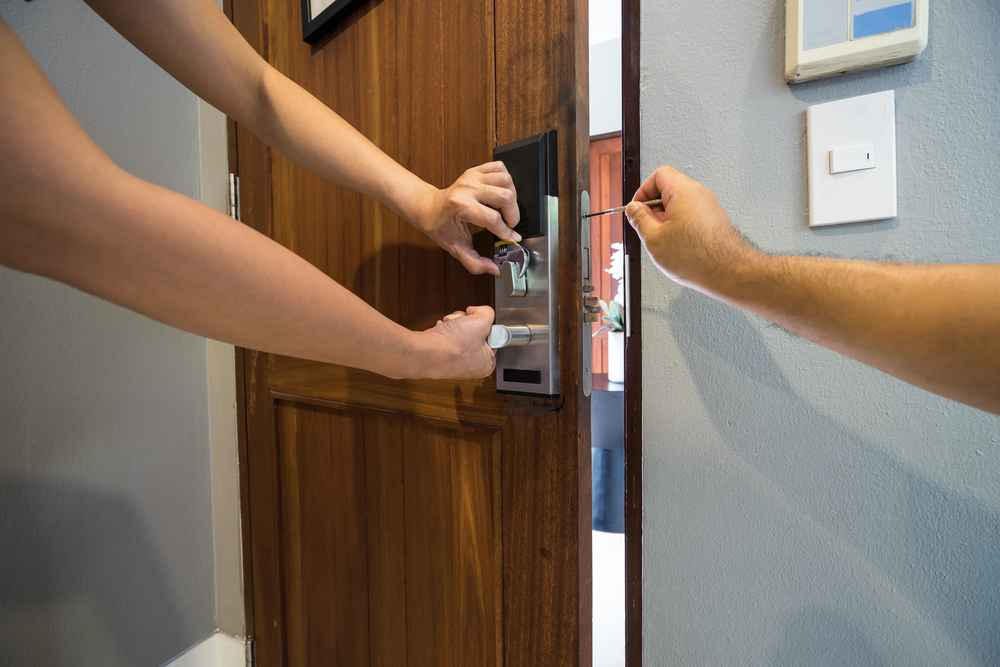Everything You Need to Know About Choosing a Smart Lock and Getting It Installed

Home security has entered a new era, and nowhere is that shift more visible than in Dubai. With residents seeking smarter, faster and more reliable ways to manage access, traditional keys have slowly moved into the background. Smart locks have taken their place—not as a luxury, but as an essential upgrade that fits the pace of modern life.
The idea of unlocking your door with your fingerprint, checking access logs from your phone, or granting temporary entry to a cleaner without handing over a physical key is appealing. Yet, selecting the right smart lock and installing it correctly requires more knowledge than most homeowners expect. Every door is different, every installation method has its own technical requirements, and every lock offers a unique balance of sophistication and safety.
This guide is written from the perspective of a specialist who has installed, repaired and evaluated hundreds of smart locks on Dubai’s villas, apartments and commercial doors. You won’t find generic advice here—only expert-level information that helps you choose confidently and avoid the problems people commonly face when they buy the wrong lock or hire inexperienced installers.
Understanding How a Smart Lock Works
A smart lock is built around three key components: a mechanical locking system, an electronic control unit and a connectivity module. The mechanical structure is the backbone. It includes the latch, deadbolt or mortise body—essentially the physical part responsible for keeping your door secured.
The electronic unit acts as the brain, processing fingerprints, PIN entries, app commands and temporary access permissions. This unit coordinates everything, from how the motor turns the lock to how the keypad responds to incorrect entries.
The connectivity module links the lock to your smartphone or home network. Some locks operate solely through Bluetooth, while others offer Wi-Fi, Zigbee or Z-Wave connectivity for remote control. Understanding these differences helps you choose a model that matches your lifestyle, whether you want to unlock your door from within a few metres or from another country.
Together, these components create a lock that behaves like a traditional one on the outside but offers an entirely different level of intelligence underneath.
Why Smart Locks Have Become the Go-To Choice in Dubai
The rapid adoption of smart locks across Dubai hasn’t been random. Residents here require a level of convenience and control that mechanical keys simply can’t provide.
A major driving factor is the pace of life. People travel frequently, live in high-rise apartments with strict building regulations, employ household staff, or manage holiday homes. A physical key becomes impractical when multiple individuals need controlled access at different times.
Smart locks solve these issues by offering keyless entry, remote unlocking, scheduled access permissions and real-time notifications. Dubai’s rental culture also plays a role. Many tenants prefer solutions that eliminate the need for duplicated keys—especially when moving in or out of a property.
Another reason is reliability. High-end smart locks from trusted brands are built with enhanced materials, reinforced locking plates and tamper detection systems that significantly exceed the security level of many traditional locks commonly found in older buildings.
Different Types of Smart Locks and Where Each One Works Best
Not every smart lock fits every door. Understanding the differences is crucial because choosing the wrong type can affect both functionality and security.
Mortise Smart Locks
Mortise locks are the most widely used option in Dubai, especially for apartments and villas. They replace the internal locking body and come with integrated handles. Their multi-latch structure offers excellent strength, making them suitable for heavy wooden or metal doors.
These locks provide fingerprint access, PIN entry, app control and, often, RFID card compatibility. They’re ideal for main entrances, high-traffic areas and properties that need strict control over staff or guest access.
Deadbolt Smart Locks
Deadbolt smart locks are more common in American-style homes but are increasingly used in Dubai villas with suitable wooden doors. They offer strong physical security and are simpler to install, making them a good option for homeowners who want minimal door modification.
Retrofit Smart Locks
Retrofit models attach to the existing lock from the inside of the door. They are popular among tenants unable to modify the door structure. Although they don’t replace the mechanical locking mechanism, they provide app control and keyless convenience without drilling or mortise changes.
Fingerprint-Centric Smart Locks
Some smart locks prioritise biometric access with highly accurate fingerprint sensors. These are excellent for families with children or homes where key sharing isn’t practical.
Each lock type has a distinct purpose. The best choice depends on the door’s material, thickness, existing lock structure and how frequently the door is used.
Key Features You Should Prioritise When Choosing a Smart Lock
Many buyers focus on branding or appearance, but the real value of a smart lock lies in its security features and performance capabilities.
The most important factor is the unlocking methods provided. A reliable smart lock should offer at least three modes: a biometric option such as fingerprint, a PIN code and mobile app control. A mechanical override key should also be included as a safety measure for emergencies.
Battery life plays a crucial role. High-quality locks provide up to a year of use on standard AA batteries and notify you weeks before power runs out. Models with emergency USB ports offer an additional safety net.
Auto-locking and auto-unlocking features add significant value. Auto-locking ensures the door secures itself when closed, eliminating the risk of accidental oversight. Auto-unlocking uses Bluetooth proximity to detect your phone, unlocking the door when you approach.
Build quality is another essential factor. A good smart lock must have a sturdy metal body, reinforced mortise and anti-corrosion coatings. Cheaper models often fail here, as their components deteriorate quickly in Dubai’s climate.
Connectivity also matters. Bluetooth-only locks work fine for basic needs, but if remote access is a priority, a Wi-Fi-enabled model will serve you better.
Smart Lock Brands That Perform Best in Dubai’s Environment
Different brands offer different strengths, and your choice should reflect your security expectations and door type.
Premium brands like Yale, Samsung, Kaadas and Philips have proven long-term reliability. They offer advanced security algorithms, high-quality mortise bodies and consistent app performance. Their fingerprint accuracy is generally superior, especially for family homes.
Mid-range brands such as Eufy, Igloohome and Hafele offer competitive features at lower prices. They are suitable for apartments where moderate use is expected.
Choosing an unbranded lock is risky. Many low-cost options lack proper encryption, use weak mechanical components and fail prematurely. A lock is a security device—saving a small amount upfront may compromise the safety of your home.
Choosing the Right Smart Lock for Your Door in Dubai
Understanding your door is as important as understanding the lock.
A wooden door offers flexibility but still requires precise measurement of thickness, mortise height and handle spacing. A metal security door, often installed in apartments, requires a heavy-duty mortise to ensure the latch aligns properly and the motor doesn't struggle.
Villa doors vary widely in structure. Some can accommodate deadbolt locks, while others need a mortise system due to weight and latch requirements.
Short-term rental properties and Airbnbs benefit from locks with remote PIN generation, temporary access codes and detailed activity logs. These features minimise guest management issues and eliminate key handover schedules.
If you are a tenant and cannot drill or modify the door, a retrofit lock is the safest option. It offers keyless entry without affecting the building’s fixtures.
Professional Smart Lock Installation: How Experts Get It Right
Installing a smart lock is more complex than fitting a regular handle or cylinder. Precision and technical understanding are essential.
Every installation begins with a thorough assessment. A technician checks the door’s alignment, structure, thickness and existing mortise. Any sign of warping, swelling or metal deformation must be addressed before installation, otherwise the smart lock may not latch properly.
Removing the old lock requires care. Mortise cavities must be cleaned, old screw holes aligned and the door surface flattened to ensure the new lock panels sit correctly. A misaligned mortise often causes the fingerprint panel to tilt, affecting accuracy.
Placing the new mortise inside the door is the most delicate stage. The mortise must sit perfectly level to avoid friction. After securing it, the front and back panels are attached. Their cables pass through the door and connect to the internal circuit board. Poor-quality installations often damage these wires, leading to malfunctioning fingerprints or keypads.
Once mounted, the technician tests the mechanical movement. This step determines whether the latch extends fully and whether the door closes smoothly. Many issues arise when the door frame is not perfectly aligned; resolving these discrepancies is part of a professional installer’s job.
The final step involves digital setup—registering fingerprints, adding PIN codes, configuring admin controls and linking the lock to the app. A skilled installer also guides the customer through maintenance routines, battery replacement and emergency unlocking procedures.
Common Mistakes Homeowners Make When Buying or Using a Smart Lock
The most frequent mistake is buying a lock based solely on appearance. A stylish front panel means nothing if the lock does not fit your door’s mortise. Another mistake is hiring inexperienced installers who handle smart locks like ordinary handles. Incorrect drilling, damaged cables or misaligned mortises can reduce the lock’s lifespan significantly.
Battery neglect is another issue. People often wait until the lock stops responding instead of replacing batteries promptly. High-quality alkaline batteries are essential.
App updates are occasionally ignored. These updates improve security patches and ensure the lock communicates effectively with the phone.
Some users register fingerprints incorrectly by pressing too hard or capturing only partial prints. A professional always advises capturing multiple angles of the same finger for reliability.
How Safe Are Smart Locks Really?
A legitimate concern is whether smart locks can be hacked. In reality, high-quality smart locks use strong encryption protocols similar to those used in online banking. They also have mechanical reinforcements that are more resistant to forced entry than many traditional locks.
Mechanical keys are surprisingly vulnerable. They can be lost, copied without permission or used long after someone should no longer have access. Smart locks remove this risk entirely by allowing access permissions to be changed instantly.
A smart lock is only as safe as its user. Weak PIN codes, shared passwords or outdated firmware reduce security. When used correctly, a smart lock provides a higher level of safety than almost any conventional locking system.
Smart Lock Installation Costs in Dubai
Professional installation is inexpensive compared to the value of enhanced security. Most installations fall into a predictable cost range depending on door type, lock size and hardware requirements.
The lock itself varies widely in price depending on brand and features. Premium models cost more because they include advanced encryption, durable mortise bodies and higher-grade biometric sensors.
Installation charges typically cover door assessment, removal of old hardware, fitting of the new mortise, panel alignment, wiring, testing and digital configuration—each step carried out with precision.
Additional adjustments may be needed if the door is misaligned or the frame has shifted over time. These corrections are essential to ensure the new lock operates smoothly.
Questions Homeowners Frequently Ask Before Installing a Smart Lock
People often wonder whether a smart lock will fit their existing door. In most cases, the answer is yes—provided the right model is selected and installed correctly.
Concerns about battery failures are common. All reputable smart locks provide a backup entry method such as a mechanical key or emergency power port.
Weather resistance is another question. Many locks are designed specifically to handle Dubai’s heat, but outdoor placements still require models built for exposure.
Fingerprint accuracy sometimes worries parents or business owners. Modern sensors are highly accurate and suitable for users of all ages, provided the prints are registered correctly.
Connectivity is also a topic of interest. Wi-Fi isn’t mandatory, but it allows remote access and notifications, which many residents find valuable.
Expert Smart Lock Installation for Your Home or Office
Smart lock installation is a precision task that demands both technical knowledge and hands-on experience. At Dex Key Maker, every installation is carried out with specialist attention to door alignment, mortise fitting and electronic calibration. Whether you’re upgrading a villa entrance or securing a commercial space, the lock is installed to operate smoothly, register fingerprints accurately and maintain long-term reliability. From preparing the door to configuring the mobile app and access controls, our focus is to ensure your smart lock performs exactly as it should — secure, responsive and confidently installed by professionals who understand modern access systems.
Final Thoughts: Why the Right Smart Lock Transforms Your Security and Convenience
A smart lock is more than a digital gadget. It is a significant upgrade to your home’s security and daily convenience. When chosen wisely and installed by a qualified professional, it becomes a reliable and seamless part of your routine—unlocking instantly through biometrics, securing itself automatically and giving you full control no matter where you are.
Dubai’s lifestyle demands quicker, smarter solutions. A well-chosen smart lock doesn’t just make life easier; it enhances safety, eliminates key-related risks and modernises the way you protect your property.





